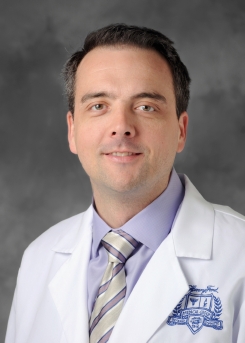Section Head, Advanced Heart Failure and Transplant Cardiology; Co-Director, Center for Individualized and Genomic Medicine Research, Henry Ford Hospital, Detroit, Michigan, USA
![]()
Written by Lenos Archer-Diaby | Editorial Assistant, EMG-Health
![]()
Q: Your areas of expertise include advanced heart failure and transplant cardiology. How did you come to specialise in these fields and what is the most rewarding aspect of your job?
A: Obviously, the topic area was interesting and I enjoyed caring for high-acuity patients; therefore, acute heart failure and (AHF)/transplant cardiology (Tx) were a good fit for me. I also had research interests and this field paired well with a research career. Currently a good portion of my effort involves investigator–initiated studies focused on genomics and precision medicine in heart failure. Finally (and critically), I had great role models in AHF/Tx at Washington University who were wonderful people and fantastic doctors which made it alluring to explore as a career.
Q: In an era of personalised treatment and robotics, what do you think could be key future treatment options for heart failure and transplantation?
A: Precision medicine is just starting to make its way into cardiovascular disease care in general, but I think in the next 10 years we will see big advances that will impact AHF/Tx from better tailoring of current treatments to novel targeted treatments, to more accurate monitoring via new markers. Similarly, we are already seeing technology play a bigger role and this will continue. We already have very good left ventricular assist devices and invasive haemodynamic monitoring which are safe and optimal for long–term use. In the future these and other technologies will get better in terms of biocompatibility, being ‘smart’ or adaptive, and becoming less invasive.
Q: If your research funds were to be doubled, how would you best make use of this?
A: For me personally I would recruit even more data scientists than I already have as we have a lot of data and hardly enough time to churn through it. Another aspect that I would amplify is modest–sized first-in-man trials testing precision interventions (tailoring treatment according to genomics or other markers) in real-world settings (pragmatic trials).
Q: You co-authored a recently published paper entitled ‘Care optimization through patient and hospital engagement clinical trial for heart failure: rationale and design of CONNECT-HF’. Could you provide an insight to the study and the intended outcomes?
A: The study is testing quality improvement and patient engagement initiatives to see whether they can reduce rehospitalisation, which continues to be a problem in heart failure. All hospitals perform a variety of quality improvement initiatives but the evidence supporting the efficacy of specific interventions to reduce readmissions or improve other outcomes is sparse, so this is an important trial. The patient engagement aspect is very intriguing, its testing mobile phone/app–based patient engagement interventions which is obviously a hot topic in today’s networked society.
Q: In regard to heart failure and transplantation, are there any racial and ethnic disparities among patients? If so, how multifactorial are the reasons behind these disparities?
A: This is a big topic that is difficult to summarise in a few sentences. There certainly are differences in rates of disease, comorbid conditions, access to treatment, and treatment outcomes; and the reasons underlying these disparities are many, with some being obvious but also some not so obvious contributors. This is an active area of investigation for me and many other researchers.
Q: As the Chairman of the Young Investigators Awards Committee, what is your day-to-day role, and what is the overarching goal of the committee?
A: The goal of the committee is to recognise and encourage our young faculty who have performed research in the hopes of cultivating future innovators in the field and continue to improve the outlook for our patients. My role is to oversee the process, grade abstracts, recruit judges, break ties, and make sure our overall goals are achieved.
Q: Please clarify what the Young Investigators Award is, who is eligible, and how it contributes to the success of the American College of Cardiology (ACC) congress?
A: We award the Young Investigators Award in three research domains: basic/translational, clinical, and epidemiologic/outcomes. Any abstract submission to the ACC is eligible; however, it is important that the contents have not been previously published or presented at a national/international meeting. When abstracts are submitted, there is an option to check a box if you would like to compete for the Young Investigators Award, usually this is of interest to trainee lead authors or those within their early career years. In my opinion including cutting–edge science at the ACC annual meeting is critical to education and keeping continued improvement in care as a goal. It also brings younger investigators and clinicians into interactions with the ACC which hopefully will help maintain our future faculty for this member-driven organisation.
Q: ACC’s mission is to transform cardiovascular care and improve heart health; what role does the Young Investigators Award Committee play in contributing to this?
A: In this instance I would like to reiterate my previous answer. However, importantly, by amplifying innovation in care and the people that drive it, the Young Investigators Award Committee will help speed the progress of disseminating knowledge, while recruiting and maintaining talented people in the field that will provide the innovations of the future.









